Key takeaways:
- Pro-life advocacy emphasizes the intrinsic right to life and involves a culture of compassion and support beyond just voicing opinions.
- Faith is a foundational element that inspires pro-life advocates to act with empathy and unity while providing tangible support to those in need.
- Effective advocacy strategies include storytelling, fostering open dialogue, and active community involvement to address the challenges faced by individuals in difficult situations.
- Real-life applications of pro-life principles include mentoring, engaging in awareness campaigns, and organizing community support events that celebrate and nurture life.
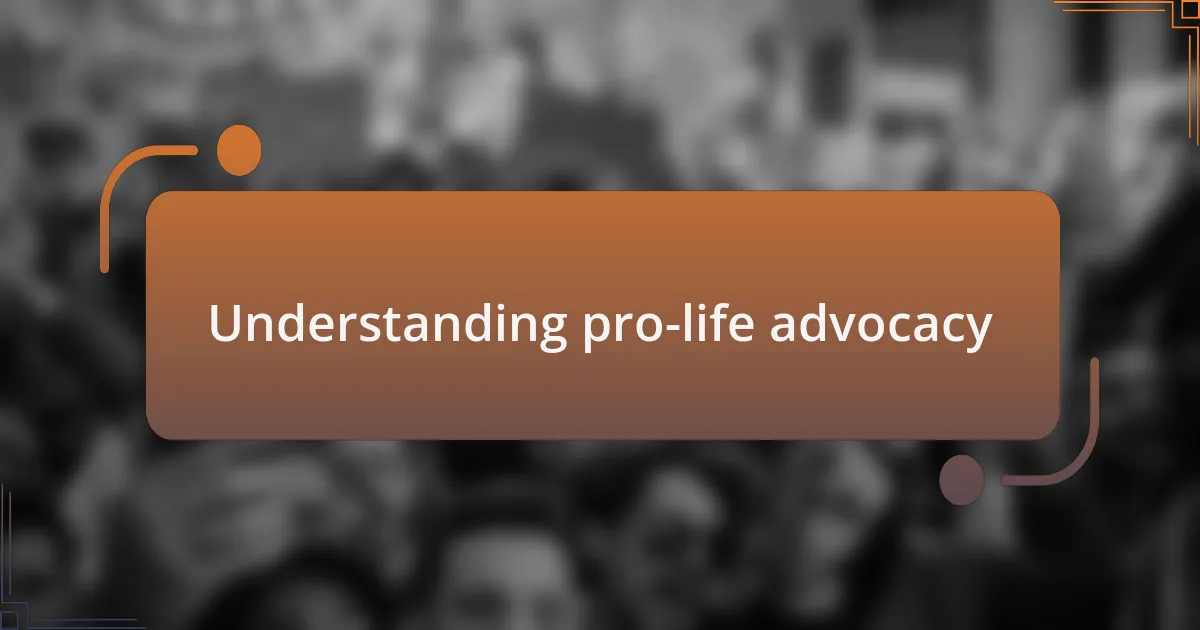
Understanding pro-life advocacy
Pro-life advocacy is deeply rooted in the belief that every human being, regardless of their stage of development, has an intrinsic right to life. I often find myself reflecting on a poignant moment from my past—a friend shared the story of her unexpected pregnancy, which transformed her perspective on life and choice. That experience highlighted how pro-life advocates understand these circumstances not merely as ethical debates, but as deeply personal and emotional journeys.
At its core, pro-life advocacy involves a profound respect for human dignity. It challenges us to ask difficult questions, such as, “What does it mean to truly value life?” I remember engaging in discussions with fellow advocates where we explored not just the laws surrounding life but also the support systems that can empower individuals facing unplanned pregnancies. It became clear to me that advocacy extends beyond voicing opinions; it’s about fostering a culture of compassion and support.
Navigating the complexities of pro-life advocacy requires an understanding of both ethics and emotions. I vividly recall attending a community event where stories of hope and healing were shared by individuals who had faced difficult decisions. Those moments reinforced my belief that pro-life advocacy isn’t just about opposing abortion; it’s about uplifting every life and offering tangible support. It begs the question—how can we better serve those in need while staying true to our beliefs?
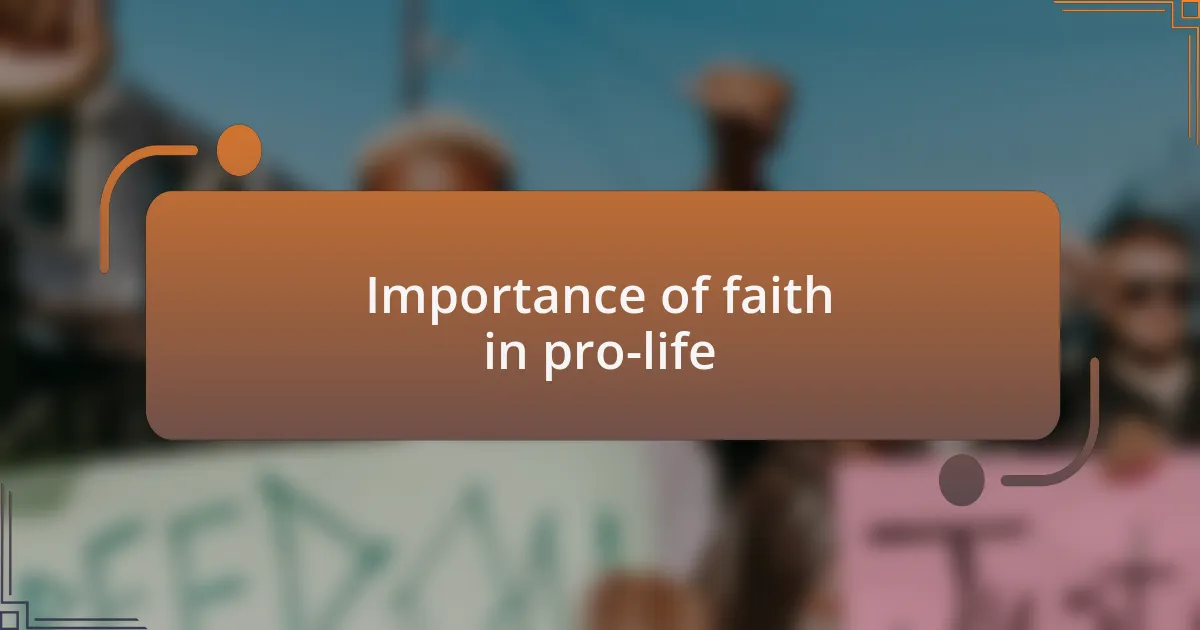
Importance of faith in pro-life
Faith serves as a cornerstone in the pro-life movement, shaping our understanding of the sanctity of life. I often draw strength from moments of prayer and reflection, where I realize that my beliefs anchor me amidst conflicting views. For many involved in pro-life advocacy, faith is not merely a personal conviction; it’s a guiding force that compels us to act with compassion and purpose.
During a pivotal volunteer experience at a local crisis pregnancy center, I witnessed how our collective faith inspired outreach to women facing challenging decisions. It struck me how, even in moments of uncertainty, the shared belief in the value of life brought us together to support each other. This sense of unity under faith reinforces that pro-life advocacy is not just about ideology—it’s about fostering a community that cherishes every individual.
I sometimes wonder, how can faith influence our approach to advocacy in tangible ways? Personally, I find that leaning into my faith helps me engage with both the challenges and joys of supporting mothers and families. It reminds us that our mission is fueled by love, urging us to extend empathy, hope, and understanding to those navigating tough choices in their lives.
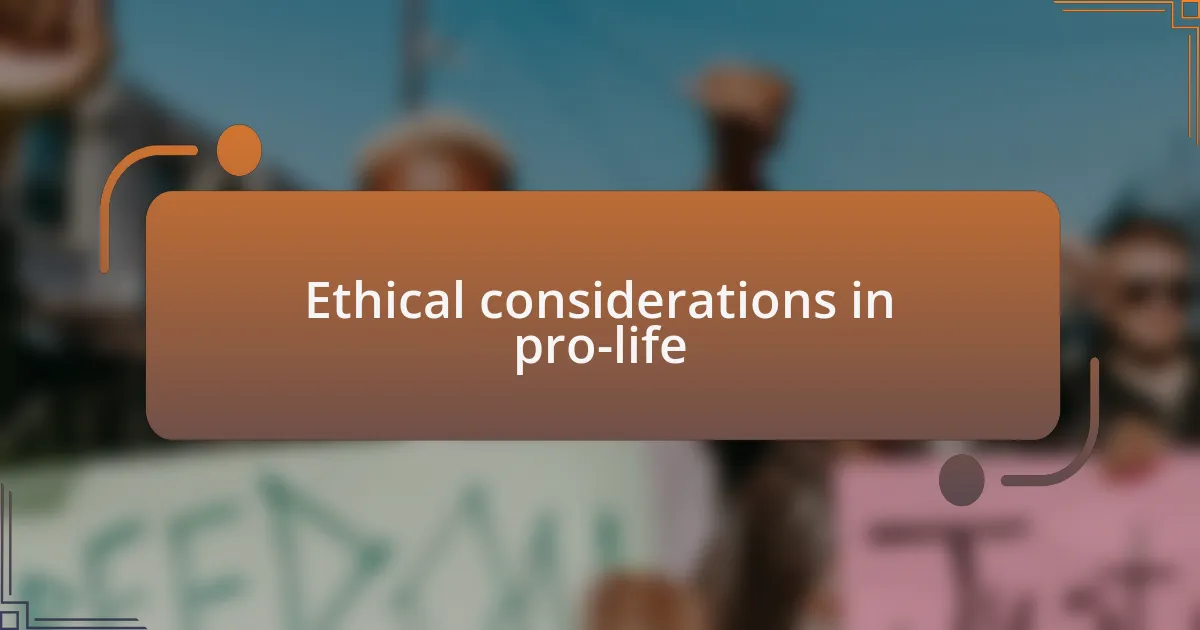
Ethical considerations in pro-life
Understanding the ethical dimensions of the pro-life movement requires a deep examination of the value we place on human life. In my experience, it is often challenging to navigate the complex moral landscape where choices and circumstances can weigh heavily on individuals. I’ve found that acknowledging the varied perspectives surrounding life and choice, while firmly advocating for the sanctity of life, creates a richer dialogue that respects the humanity of everyone involved.
One moment that stands out for me was a discussion among friends about ethical implications in cases of severe fetal abnormalities. As the conversation unfolded, I felt a surge of empathy for vulnerable families who might face such heartbreaking decisions. I realized then that our ethical framework must not only advocate for life but also consider how we can offer support and understanding to those who are torn between hope and despair.
Reflecting on these ethical considerations, I often ask myself: how can we effectively communicate our pro-life stance while being sensitive to the nuanced realities people face? In my advocacy role, I strive to find that balance by sharing stories—real-life testimonies of families who chose life and how it transformed their hearts. It’s these narratives that emphasize that ethics in pro-life advocacy isn’t just about what we believe, but about how we connect those beliefs to the everyday struggles and triumphs of individuals.
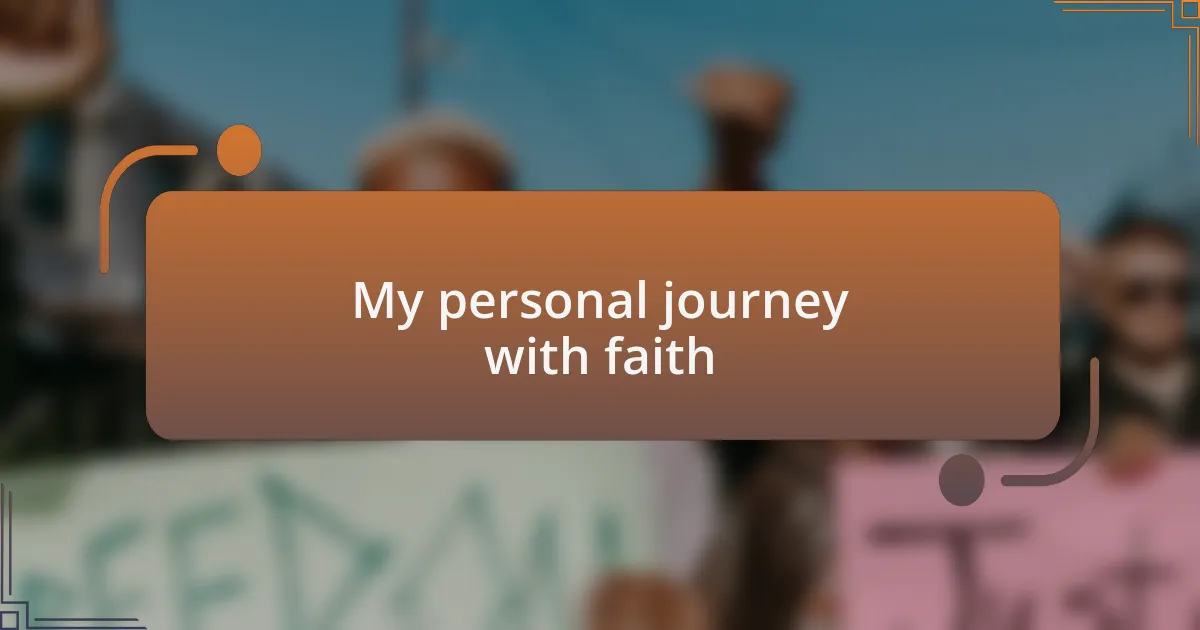
My personal journey with faith
My personal journey with faith has been a constantly evolving experience, often intertwined with my understanding of ethical principles in life. I remember a pivotal moment during a church retreat where I found solace in prayer, contemplating my beliefs regarding life and choice. It was there that I realized faith could serve as both a guiding light and a source of strength in my advocacy, fueling my determination to uphold the value of life.
I still vividly recall a conversation with a close friend who struggled with the decision to carry a pregnancy to term after receiving grim medical news. Listening to her fears and uncertainties deeply affected me. It struck me that faith is not merely a doctrine to uphold but a living, breathing connection to empathy and compassion—one that allows us to walk alongside those in distress and offer them support without judgment.
As I reflect on my path, I often wonder how my faith shapes my approach to difficult ethical questions. Does it challenge me to dig deeper into understanding nuances, or does it reinforce a more rigid perspective? Through this ongoing exploration, I’ve discovered that embracing the complexities of faith keeps my heart open, reminding me that love and understanding must guide every discussion about life.
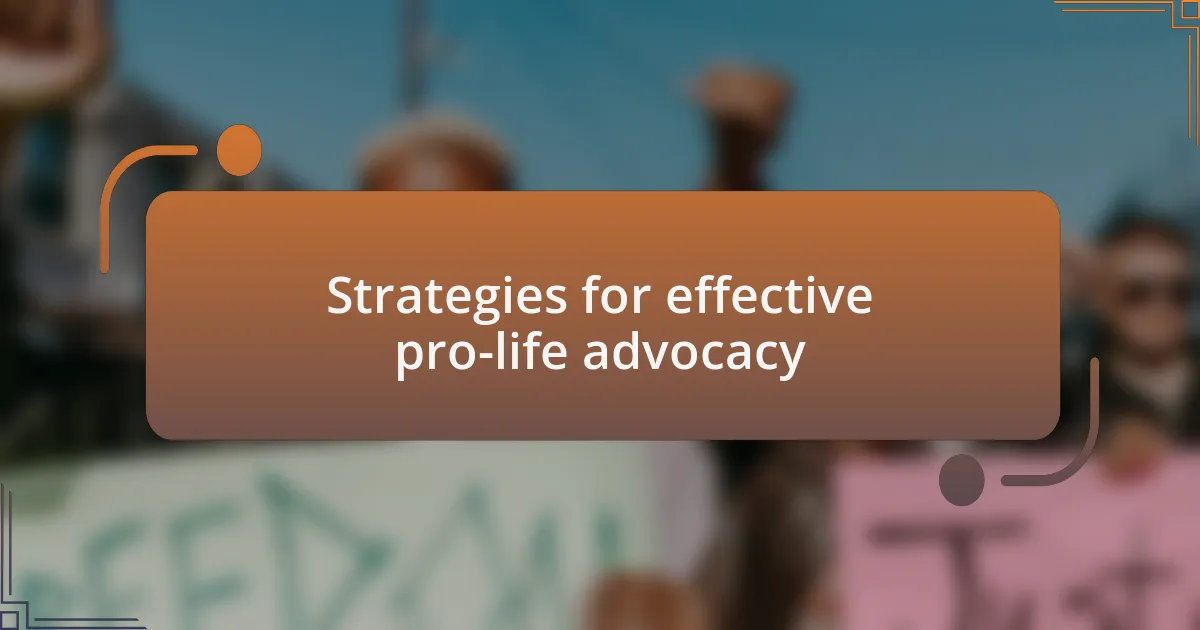
Strategies for effective pro-life advocacy
When it comes to effective pro-life advocacy, I’ve found that storytelling can be one of our most powerful tools. Sharing personal experiences—like the time I participated in a panel discussion featuring mothers who chose life against all odds—created an environment where listeners connected emotionally. It’s fascinating how narratives can bridge gaps in understanding, prompting deeper reflections about the sanctity of life.
Another strategy I’ve embraced is fostering open dialogue. In my discussions with both supporters and those who disagree, I emphasize active listening. This approach often leads me to question underlying beliefs—What fears are driving their choices? By seeking to understand their perspectives, I create a foundation for respectful conversation, which can transform adversaries into allies over time.
Finally, I believe in the importance of community involvement. Volunteering at local shelters and pregnancy resource centers has not only enriched my understanding of the challenges faced by expectant parents but has also forged meaningful relationships. How can we truly advocate for life without being present in the communities we aim to serve? This hands-on involvement reinforces the need for compassion and support, allowing us to demonstrate our commitment to life in tangible ways.
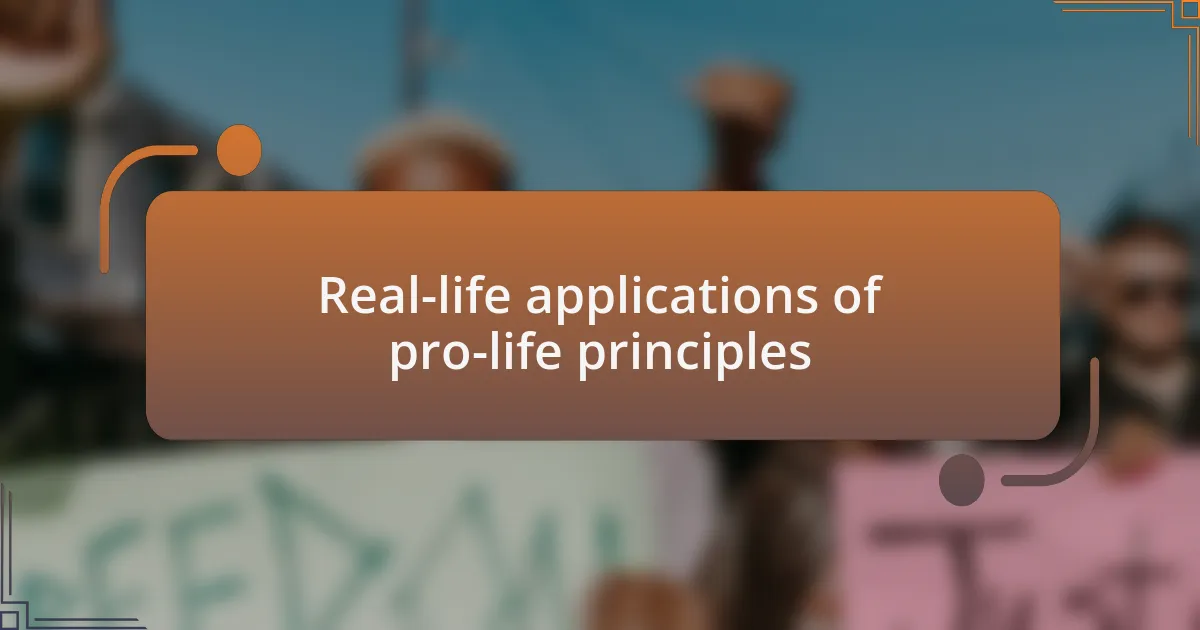
Real-life applications of pro-life principles
One real-life application of pro-life principles that I’ve experienced is through mentoring young women facing unplanned pregnancies. I recall a time when a high school student confided in me about her fears regarding her future after discovering she was pregnant. By providing a listening ear, practical advice, and emotional support, I witnessed how hope can flourish even in the most challenging circumstances. This experience reinforced the idea that advocating for life often means walking alongside someone in their journey, helping them see viable paths forward.
In another instance, I participated in a local awareness campaign aimed at addressing the complex reasons behind abortion. While handing out information, I encountered individuals who felt trapped by their situations and feared judgment. Engaging them in conversation led me to realize that our pro-life message has to include real solutions, like accessible healthcare and educational resources. How can we advocate for life if we don’t address the holistic needs of those in difficult situations? This commitment translates into proactive efforts that not only affirm life but also empower those who need it most.
Additionally, I have often found strength in organizing events that celebrate life, such as baby showers for mothers in need. This initiative fosters community support and celebrates the joy of new life, but it also highlights the importance of collective responsibility. I remember the excitement on the mothers’ faces as they received gifts and encouragement from the community; it was a moving reminder that we can unite to create a culture that values every life. Doesn’t it make a difference when we come together to nurture those who are vulnerable?